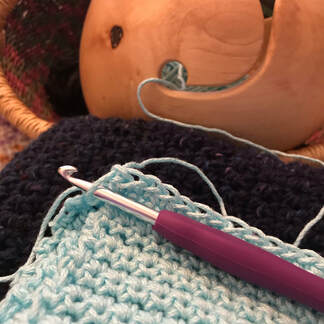|
--> CW for talking about falling down and getting hurt. <--  As I'm recovering, much time to crochet. (Beautiful yarn bowl handmade in Northumbria by Turned Studios.) As I'm recovering, much time to crochet. (Beautiful yarn bowl handmade in Northumbria by Turned Studios.) Background: A week ago today I tripped outside while gardening, and injured myself pretty thoroughly. I was amazingly blessed with luck, though. An actual medical doctor just happened to be strolling down the sidewalk directly in front of my house when I fell, and set about helping me. Not only was he competent, he was very consent oriented, apparently, and asked my permission to come in the yard, to check for broken bones, etc., at every step. AND, his wife soon arrived, also a doctor, helped, too. They both agreed that I should go to urgent care for stitches, which I eventually did. I just realized that this is the only time in my life I’ve ever had stitches, outside of a surgery or childbirth tear. I now fully realize how retraumatizing it can be the have to take care of a wound. For this one, it has to be done at least once a day. Yesterday, when I did it about a hour before work, I regretted the timing. I was shaky and nauseated and not thinking well for the first couple of hours. This whole event has reminded me once again that we can’t measure “trauma” by the face of the event. Of course I know this intellectually, since it’s my job, and say it to other people all the time, but that’s different than really feeling it. On the face of it, it’s not so bad. I fell down and hurt my knee. I got help. It’s going to be ok. But watching my body, my autonomic nervous system (ANS), go through all these changes has been stunning. Clearly, the non-cognitive parts of my brain, nervous system, muscles and bones don’t feel like this was/is a “small” accident. There can be many reasons for this: How the body feels about this invasion/injury, quite apart from how my cognitive judgments feel about it; past experiences that my system may be processing as similar in some way, outside of my conscious awareness; any number of other threads, connections, factors that I'm not remembering or perceiving with my cognitive processing. What I think is a good take away from that — and again, something I try to give kindness to all the time with others — is the ability to just be kind to oneself when an impact is greater than your “rational” brain or the culture or other people think it should be. To go with the waves, take good care, and give the body the chance to process it all through, metabolize the shock. The day after I fell I couldn’t even keep any food down. I even threw up violently twice. A friend who used to be a nurse thought it was the opioids, but I’ve never had a problem with them, and later that day I could take them again just fine for this. I really think it was my body working through the shock (because of my work I can even identify what the various parts of the polyvagal system are doing as they happen, which is really interesting). (It also didn’t help that I was food deprived for too long after the accident.) It's very confusing trying to work out what one needs and doesn’t need, in the thick aftermath of an accident. Very confusing. As the ANS ramps up, executive function goes down. When the emotional reaction is to try to be brave, this sets us up to not get the help we need. For many of us, there is a big tendency to minimize and try not to inconvenience people. If there's someone around who is not really into taking the time to take you to urgent care or whatever, that weirdness can create even more confusion and push toward minimization and doing less than is needed. This is dangerous. My message here is: don’t judge others’ distress, or needs, or the impact of an event on them. We should not think we know whether an event was "really traumatic" or not, based on the event itself. It's all about the effect of the individual, and there can be so many factors, many of them invisible to us, that come into play. And -- this is super important -- we should not judge ourselves that way, either. A professional trauma therapist can help figure this out, through good, solid assessment, and that assessment includes the effects on the person, not picking from a list of events that "count" as "traumatic." So, whether for ourselves or others, we should just observe what’s happening with compassion, help all we can, and get the professional medical, healer, or therapy help that may be needed. It’s impossible to overestimate the value of love and care when these things happen. That the doctors happened to be there when I fell, wow, that is huge for long-term traumatic effect amelioration. That later there was someone else who wanted to leave before I was fully cared for, that is not so good. And always, always make sure someone has a nice something to eat, a good place to rest, and the medical care they need after they’ve had an accident, if it is in any way in your power to do so. When people are in even mild shock or post-event ANS dysregulation they probably won’t be able to express what they need, or even know for sure themselves. People in that state actually do need guidance and care.
1 Comment
|
Margaret Howard, MFA, LCSWDepth somatics psychotherapist, regenerative gardener, writer, elder, explorer. Essays
All
Archives
May 2023
|